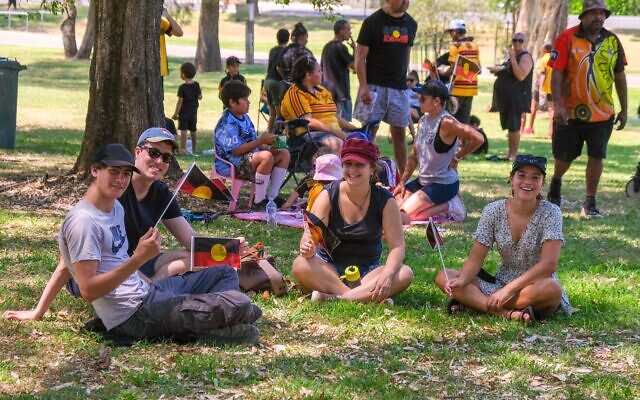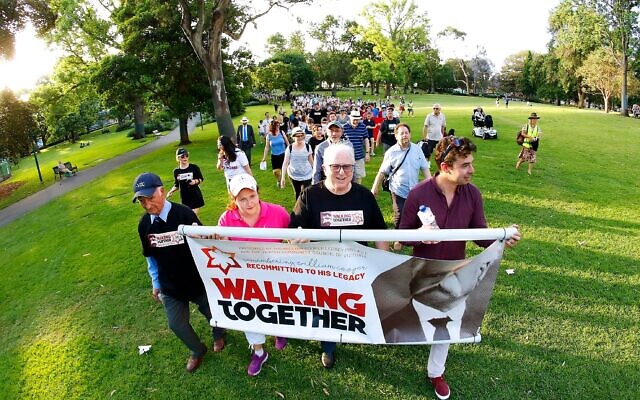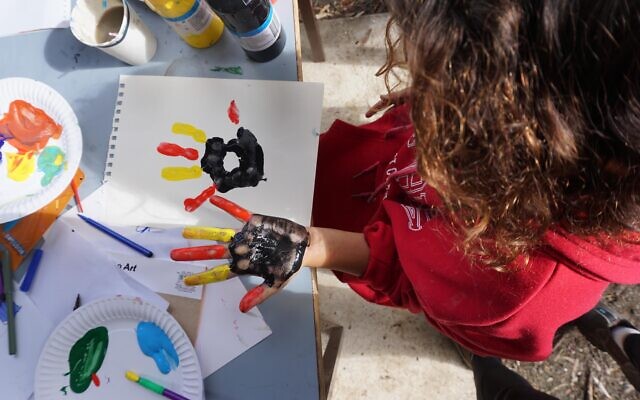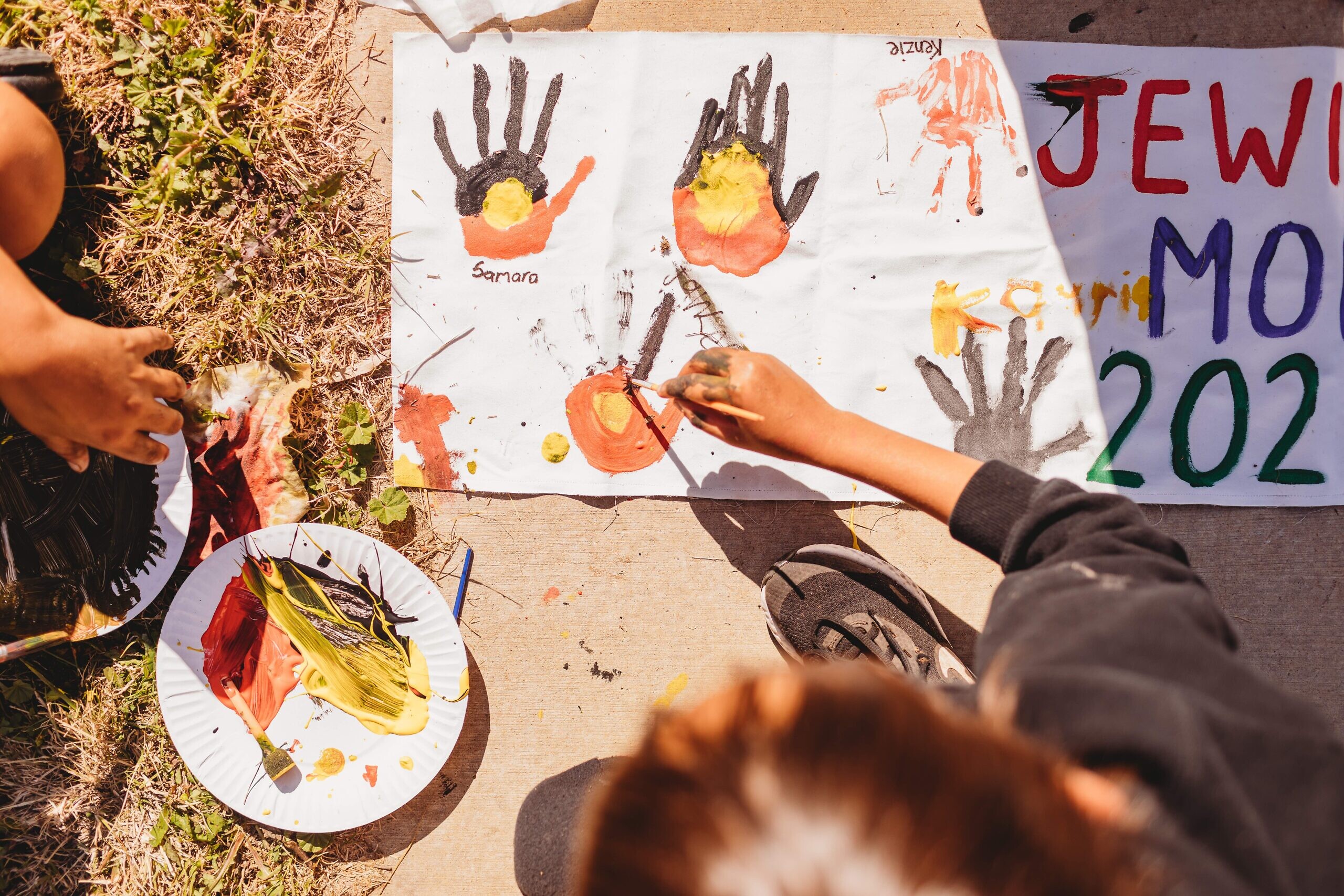WHEN William Cooper and members of his Australian Aborigines’ League marched to the German consulate in Melbourne in December 1938 to protest against Kristallnacht, the toxic embers of the Nazi pogroms were still glowering in faraway Europe.
Although it was not the only cry for justice raised in Australia for the Jews of Nazi-occupied Germany and Austria as the last full year of world peace faded from the calendar, what was remarkable about Cooper’s quixotic odyssey from his home in Footscray to the vaulted doors of Nazi Germany’s Collins Street legation was how much his organisation was punching above its weight.
Representing a community that until 1967 would not even be counted among the Australian population, the League’s foray over Kristallnacht was plucky, but it reverberated with a shared cry for justice between two peoples – even if they were separated by continents and by very different histories.
When in 1992, Jewish barrister Ron Castan, as senior counsel in the Mabo case, drove a bulldozer through the judicial doctrine of “terra nullius”, the notion that Australia’s European arrivals had settled a vacant land, it was almost as if he had repaid Cooper’s extraordinary act of brotherhood.
In 2020, lawyer, academic and land-rights activist Noel Pearson launched The Powerbroker, journalist Michael Gawenda’s biography of Jewish communal icon Mark Leibler, an avowed Indigenous rights advocate. Pearson harked back to his years as a law graduate who first encountered Leibler at his legal firm Arnold Bloch Leibler, where under his mentorship, the young articled law clerk would hone his profession. The place again was Collins Street, and this time it was an address for learning and inspiration.
“We bring First Nations voices, stories and histories into the Jewish community.” Stand Up CEO Courtney Winter-Peters
“I learned from the Jewish community, and from Mark in particular, that while the Jewish people have long been victimised, they have never succumbed to victimhood. And that paradox really seized me,” stated Pearson in launching the book.
The remnant of the Holocaust that flourished in Australia had become a role model for Indigenous Australians in a remarkable and diverse friendship between communities that has nourished both.
Pearson wanted to contribute to this week’s AJN feature, but campaigning for sports organisations and other bodies to embrace the ‘Yes’ case in this year’s referendum on an Indigenous Voice to Parliament has consumed his hours.

Championing Indigenous rights for years, Leibler, who is national chairman of the Australia/Israel & Jewish Affairs Council, has co-chaired Reconciliation Australia in the 2000s, the Expert Panel on Constitutional Recognition of Indigenous Australians under then prime minister Julia Gillard, and the Referendum Council leading to the 2017 Uluru Statement from the Heart.
“I think we do have an obligation to do something to right the wrongs of the past,” Leibler said about the Voice this year. “The question for many will come down to whether a constitutionally enshrined Voice will be of practical benefit to First Nations people by giving them both an input into and a shared responsibility for government decision-making on matters that affect them.”
During Reconciliation Week this week, the Voice – and commitment to it by many sections of the Jewish community – lies at the heart of Jewish–Indigenous relations. Seen by many Jews as an instrument of reconciliation, others in the Jewish community view it potentially as a spanner in the works of a functioning Westminster system.
Politically, two senior Jewish figures, national frontbenchers, have played conspicuous roles. Attorney-General Mark Dreyfus this year launched the legal framework for the Voice. And Julian Leeser stepped away from his Indigenous Affairs shadow portfolio to campaign for the Voice after the Liberal Party bound its frontbench to a unified stance against it.
With the re-election of Labor last year, Dreyfus, a lawyer and a very recognisable face of the Jewish community, returned to the role of Attorney-General he had held under the Rudd and Gillard governments. His second innings as the nation’s lawyer-in-chief came at a historic crossroads – it was Dreyfus’ role in March this year to announce a bill underpinning the proposed Indigenous Voice to Parliament. In doing so, he consolidated a commitment to a Voice referendum made by Anthony Albanese as PM-elect in his election-night speech last May.
Asked about his perspectives on the Voice, Dreyfus reflected to The AJN that enshrining a Voice for First Nations peoples in the Constitution “is about recognising and listening”.
“Recognising Aboriginal and Torres Strait Islander peoples as the First Peoples of Australia. And listening to the voices of Aboriginal and Torres Strait Islander peoples when it comes to laws and policies that affect them. Because listening to communities leads to better laws and policies – and better outcomes in areas like health, education and housing.”

Dreyfus laid out what he believes the Voice is and what it is not. “Critically, the Voice will be proactive. It will not have to wait for the Parliament or the executive to seek its views before it can provide them. But nor will the constitutional amendment oblige the Parliament or the executive government to consult the Voice before taking action.
“In the words of that historic statement: ‘In 1967 we were counted, in 2017 we seek to be heard. We leave base camp and start our trek across this vast country. We invite you to walk with us in a movement of the Australian people for a better future.’ It is now 2023. It is time to accept the generous invitation in the Uluru Statement from the Heart.”
On the other side of politics, Leeser, after resigning from the shadow frontbench, spoke to The AJN about the freedom within the wider Parliamentary Liberal Party to follow conscience. And he couched it in terms of Passover, the holiday during which he finalised his momentous decision to return to the backbench. “Pesach is all about freedom. And the freedom we have in the Liberal Party is if you’re not a member of the frontbench, you’re free to campaign on an issue, take a position that is contrary to the rest of the party.”
“I think we do have an obligation to do something to right the wrongs of the past.” Mark Leibler
Writing in The AJN this week, Leeser added, “No matter where we all are in politics, there is agreement things must change. I believe the key to change is found in partnership and through empowerment. It was Ken Wyatt [minister for Indigenous Australians in the Morrison government], the first Indigenous person to hold executive office, who redesigned the Closing the Gap process to focus on partnership. A top-down approach to Indigenous relations doesn’t work. It never has, it never will. Ken’s work meant that when it came to the critical work of Closing the Gap, the Commonwealth, along with the states and territories, worked in partnership with Indigenous groups.
“Successful partnerships are always about respect. I believe we must work in genuine partnership and that means listening to Indigenous Australians rather than assuming that Canberra knows best.”
Social Justice organisation Stand Up has announced the launch of Kol HaLev, its campaign in support of the ‘Yes’ vote in the referendum. In partnership with the Jewish Community Council of Victoria, Stand Up is calling on community groups nationally to join the campaign.
And through its regular programming, Stand Up will be running programs throughout Jewish schools, as well as supporting its partner Children’s Ground’s ‘Wear it Yellow’ Campaign, designed to help create a better future for First Nations children and families.
Prompted on how she sees the politicisation of the Voice issue, Courtney Winter-Peters, Stand Up’s CEO, said, “It’s challenging that party lines have been drawn on this, but that’s a feature of Australian politics. The politics of division are dangerous but people are always entitled to their views. Stand Up is not a partisan organisation, but we also aren’t afraid to speak up on what we feel is important. In this case, we’re supporting the ‘Yes’ vote and we want to bring the rest of the Jewish community along with us.”
Winter-Peters told The AJN that at the wellspring of her organisation’s Indigenous programs is a timeless confluence of values. “At Stand Up, we are inspired by both ancient and contemporary Jewish calls to pursue social justice. We often reflect on even all-too-recent experiences of persecution, and are inspired by survivors such as Elie Wiesel, who said, ‘What hurts the victim most is not the cruelty of the oppressor, but the silence of the bystander.'”
Through its Derech Eretz program, Stand Up volunteers continue to return to Toomelah and Boggabilla in northern NSW each year to facilitate fun and engaging school holiday programs. “Our long-lasting friendship based on mutual respect, admiration and a desire to learn and grow from one another, has allowed us to simultaneously inspire and change the perspectives of Jewish people on First Nations issues and justice, while making a longstanding and valuable contribution to the people of Toomelah and Boggabilla.
“Come Together has become one of our pivotal programs,” said Winter-Peters. “Through open conversation, we bring First Nations voices, stories and histories into the Jewish community. We recognise that before we move forward as a nation, we still have to heal the wounds of the past. If we come to a shared understanding of the past, we hope to come to a better understanding of the future we can build together.”
B’nai B’rith Victoria’s First Nations Reconciliation Project was formed following the B’nai B’rith and JCCV Human Rights Oration by Professor Marcia Langton in 2021. The project’s volunteers have organised an extensive series of talks and information sessions on Aboriginal and Torres Strait Islander people.
“This was due to our realising the lack of information on the issues in the general community,” stated Jack Aghion, B’nai B’rith Victoria vice-president and chair of the project.
One of its events was an information session in May with Professor Kevin Bell, the Yoorrook Justice Commissioner, who explained the work of the Truth and Treaty Commission.
As part of a B’nai B’rith Shavuot shiur, Bell – a former director of the Castan Centre for Human Rights Law – shared his insights about the work of the Yoorrook Commission, established by the Victorian government, to collect witness statements on Aboriginal history in Victoria.
Noting that B’nai B’rith was likely to adopt a national policy on the Voice at its conference this year, Aghion reflected that B’nai B’rith Victoria “has always been supportive of human rights and was therefore primed to accept the ‘Yes’ cause in the forthcoming referendum”.

In doing so, it aligned itself with the position already taken by the JCCV, the Executive Council of Australian Jewry and other Jewish organisations.
Two years ago, B’nai B’rith Victoria issued a public statement, jointly with JCCV, supporting the objectives of the Uluru Statement. B’nai B’rith’s Reconciliation Project has held numerous events to promote understanding of the history and needs of Australia’s First Nations peoples.
B’nai B’rith Victoria president Dr Peter Schattner expressed his personal view. “I have accepted the argument that continuing to do what we have done for our First Nations in the past will not work, whereas a Voice might shift the dial a little. This is not guaranteed – but given the extent of the consultation that has occurred over many years on this matter, there is a chance that this will help address significant issues in disadvantaged Aboriginal communities.”


comments